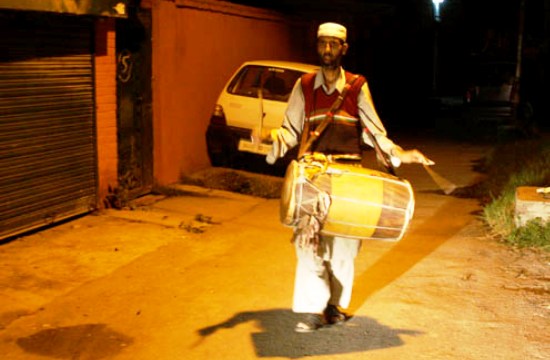
Ramadan human alarm clocks rouse restive Kashmir
By: Izhar Wani
SRINAGAR, Wednesday 8 September 2010 (AFP) – For 30 years, Rashid Malik has walked the narrow lanes of Srinagar before dawn during the Muslim holy month of Ramadan, waking up residents for another day of fasting.
But being a “human alarm clock” in Indian Kashmir is a nerve-wracking job this year, as the region undergoes almost daily violent protests against rule from New Delhi and the killing of scores of civilians by security forces.
“It has been an extremely fearful assignment,” said Malik, 64, who beats a drum and loudly chants “Wakhta-e-Sehar”, meaning “Time for Sehri” — the last meal before fasting begins at sunrise.
“The presence of security forces worries me and I have been avoiding main roads to escape being attacked,” said Malik, who patrols the old town of Srinagar, Indian Kashmir’s summer capital.
“I have performed this religious duty even during the peak of insurgency but this year is the most frightening,” he said, adding that he gets paid in small donations and food offerings from households.
Since a 17-year-old student died after being hit by a police teargas shell on June 11, security forces have been accused of killing 68 more protesters and bystanders, mostly teenagers shot dead during angry demonstrations. Each death has led to more furious protests and further firing by the security forces.
The Muslim-majority Kashmir valley has been effectively shut down by curfews and separatist-sponsored strikes. Government troops are out in strength to quell protests and to enforce restrictions on civilian movement.
Anyone out at night attracts the attention of the nervous and often aggressive security forces, so the drum-beaters run the risk of a tough grilling — or even a bullet. “Over the past few years it was fun walking these streets but this year the fear has returned,” said Syed RehmanTass, 35, who makes his noisy way through the streets from about 03:00 am to 04:00 am every morning.
“I just have to hope the soldiers are aware of the tradition,” said Tass, who was only 15 when he first took up the job of rousing people during Ramadan.
“The anxiety increases when I go past an army bunker or see paramilitary groups in the dark. I have been stopped twice recently but was allowed to continue after questioning why I was out at this time.”
The tradition of chanting, banging drums and gongs, and blowing pipes made from sheep horn has survived because residents say the sustained cacophony ensures they get up and eat rather than doze off again.
“These poor people ensure we are out of our beds,” said Sofia Jabeen, a government employee. “They are an essential part of the holy month and we respect them for the high-risk job they do.”
During the 20-year insurgency in Kashmir, government troops have often been suspicious of cries of “Wakhta-e-Sehar” — even accusing the drum-beaters of passing information to militants ahead of security raids.
Many drummers were beaten up or detained when the violence was at its worst in the early 1990s. “Every night when I set out, I murmur prayers as I am not sure whether I will return alive, but I know I have to do this for the sake of my family,” said Mudasar Ahmed.
“Several of my colleagues decided to quit this year because of the unrest.”
Ramadan is due to culminate in Kashmir on Friday or Saturday, depending on the sighting of the new moon, when Eid al-Fitr celebrations will break out and people attend mosques and visit family members to exchange gifts.















